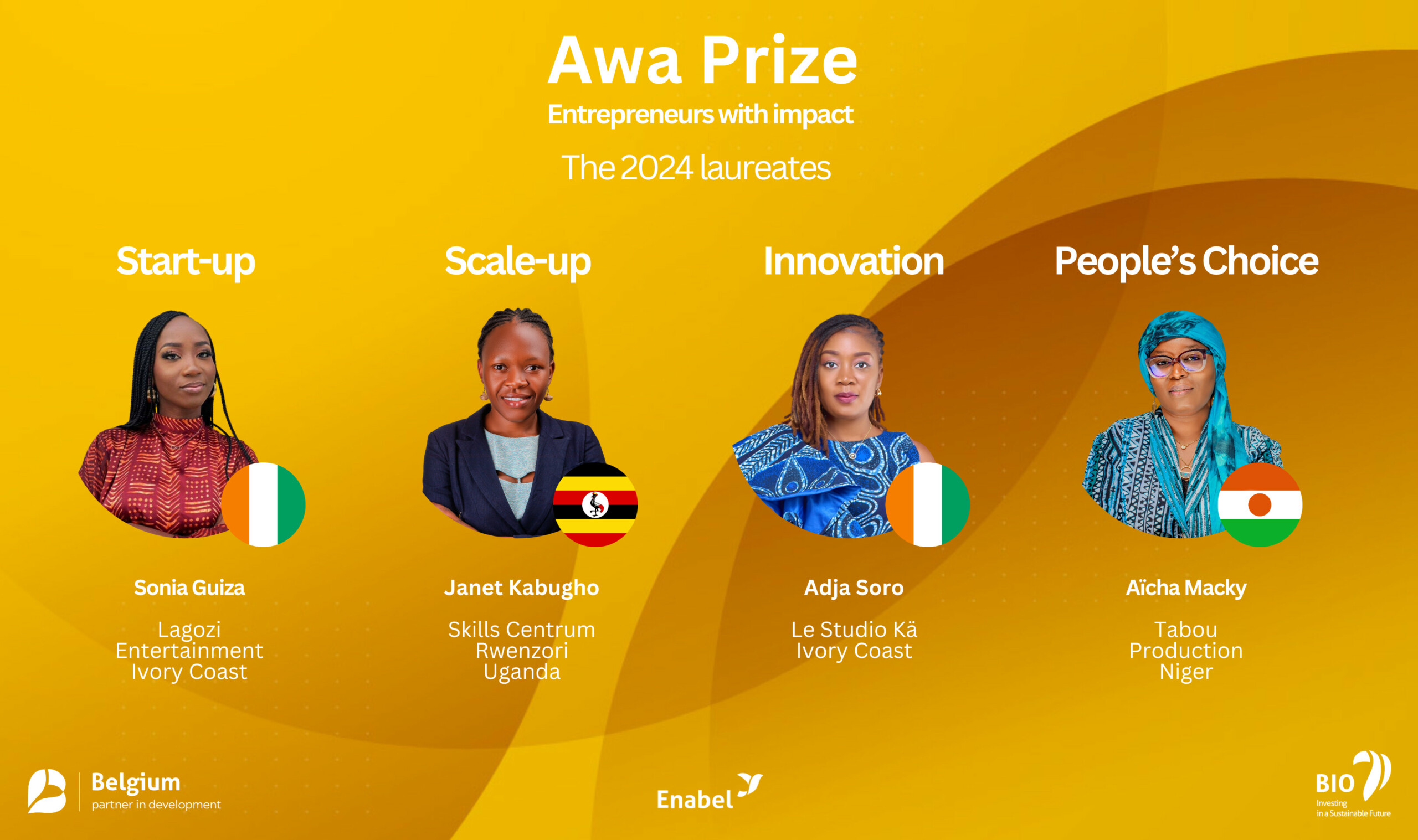Digitalisation

The rapid spread and scale-up of digital technologies and services has created new opportunities for sustainable development and inclusive growth in the world but has also deepened the ‘digital divide’ that individuals are facing. This digital divide impacts people’s ability to benefit equally from digital opportunities and therefore socio-economic inequalities risk to be deepened.
What we do
Digital Skills
Specific skills are needed to fully benefit from digital services and tools. Groups with vulnerabilities sometimes lack basic (digital) literacy. Furthermore, more advanced digital skills are increasingly important to be successful in education and ensure decent work.
- Basic digital literacy: Enabel focuses on awareness raising campaigns on the opportunities for digital and on collaboration with governments to ensure awareness at all levels of society is increased. In terms of basic literacy and numeracy, we integrate this where necessary in focused programmes (e.g. for staff members in hospitals where a digital transformation is planned), but our organisation does not support nationwide digital literacy campaigns.
- Advanced digital skills for education and the world of work: This category includes competences that are variously referred to as computer literacy, ICT literacy, information literacy, but also goes beyond by including critical “soft skills” such as problem solving, communication and collaboration, etc. In education, for example, Enabel supports activities such as the development of digital hubs, provides training and skills development for teachers and students, co-develops local digital content and equips education institutions. For the world of work, Enabel focuses on digital skills trainings for entrepreneurs in close collaboration with ministries overseeing digital (skills) policies and the civil society (e.g. innovation hubs or fablabs).
- Digital economy skills: Enabel supports short-to medium term, hands-on trainings for inclusive and decent employment in the digital and data economy. We collaborate with higher education institutions to support professional digital trainings.
- Digital leadership skills: Digital leadership skills are needed to ensure good governance and ensure sustainability in all its aspects. This requires not only training for digital competences but also training on business analysis and strategy development. Enabel provides digital skills training for administrations and non-profit entities, focusing on the ability to define, coordinate, maintain and evaluate digital transformation strategies and programmes.
Digital Rights
Ensuring human and civil rights in the digital space is key to an inclusive digital society where everyone has (digital) access to the same basic services. Therefore, Enabel adopts a human rights-based approach in providing and expanding access to digital technologies. We tackle the above risks and ensures digital rights are uphold through:
- Information: Enabel supports awareness raising campaigns and activities to ensure all citizens acknowledge that human and fundamental rights also apply online, just as they do offline.
- Prevention: Enabel supports capacity building for government & civil society organisation staff and citizens to ensure they understand best practices in digital rights and security. Ministries should be able to plan mitigation strategies for risks to digital rights. Awareness campaigns focused on prevention are also supported.
- Mitigation: Enabel works where possible in close collaboration with government services to provide access to qualitative and sustainable (digital) support services. For instance legal support and psycho-social services should support victims to remove digital right violations and protect themselves.
Digital Governance
Enabel supports national and decentralized government services to co-construct with the citizens and all stakeholders involved their digital governance stack through three key actions:
- Digital transformation policies & strategies: Enabel advices governments on the risks and benefits of their digital transformation strategies, co-creates public policies and promotes policies ensuring a secure and open Internet. Enabel’s approach is based on the principles of good governance and includes the translation into concrete action plans including capacity building and exchange for/between government partners. Enabel focuses on crosssectoral (e.g. national or regional level digital policies) as well as sector specific (e.g. digital health or education) policies. To achieve this, Enabel supports digital agencies and ICT ministries of partner countries in their coordination and expertise roles via sharing of experiences, coordination & change management support and expert advice sourced from the Belgian digital ecosystem.
- Digital building blocks: Enabel supports the development of digital building blocks which facilitate governments, civil society and entrepreneurs to deploy e-services more easily. One of the key building blocks Enabel particularly focuses on, is digital civic registries and digital identity. Enabel supports the development of reliable digital identity systems by ensuring it is backed by a solid and dedicated digital civic registry (not merged with other registries). Enabel leverages Belgian success stories of e-gov technology (such as civil registries) by contextualizing them with all stakeholders to ensure partner countries can leapfrog.
- Interoperability of digital services and open (big) data: Enabel works with government, civil society, and private data economy partners to ensure open data is routinely published by governments and government staff have the necessary skills to work in an open data economy. Enabel also supports programmes that interconnect government services and ensure data becomes interoperable. Enabel also promotes the use of open data platforms to enhance civic participation at local and national level.
Digital Service Delivery
To choose which services Enabel is going to support in a particular country, an assessment is made based on information gathered at country level by digital staff, through expertise sharing and through analysis of existing digital economy or digital readiness assessments. A step-by-step approach in developing and implementing programmes is taken depending on the specific needs of each partner country, ensuring the inclusion of a strategy for digital skills and rights and off course taking into account the prerequisites and the guiding principles. To further guide the development of programmes, Enabel publishes sectoral guidelines for digital for development. These notes “from policy to practice” support the operational roll-out for the digital transformation approach in a particular sector at global level.
Digital Economy and Entrepreneurship
Enabel supports inclusive digital entrepreneurship through the following key actions:
- An inclusive ecosystem approach for the digital economy by strengthening the quality of support services (incubation & technical) for digital entrepreneurs and improving coordination & networking between the different actors of the ecosystem (incubation, financial services, and government services). We also collaborates with innovation and tech hubs to ensure that they can extend their services and support to secondary cities. Our organization also explores how to support access to finance better for digital startups.
- To advance the participation of women in the digital and digitally enabled economy, Enabel supports short- and medium-term digital skills trainings (hands-on, practical trainings) based on partnerships. Access to digital entrepreneurship support services is ensured through communal trusted spaces where adverse gender stereotypes are addressed by leveraging role models and by establishing supportive communities. Finally, the interest of girls in digital tools is increased at an early age through STEM education and awareness raising of opportunities in the digital economy.
- To ensure a twin transition in the green and digital economy, Enabel promotes the use of digital fabrication technologies for the circular and green economy. Enabel supports entrepreneurs by establishing fablabs and promoting makers communities for the development of innovative digital solutions for the green economy, repair services and for recycling business activities.
Activities in the spotlight

Did you miss the eLearning Africa Conference 2022? Discover it in four highlights.
eLearning Africa 2022

Today the Belgian development agency Enabel, signs the Charter for Digital Inclusion in the framework of DigitAll, a digital inclusion ecosystem bringing together companies, social organisations, federal and regional governments and administrations, with a view to creating synergies and fostering cooperation between these actors.
DigitAll
More on Digitalisation
Digitalisation is not a goal by itself, but it can be a strong catalyst to help achieve the SDGs and promote sustainable development. We address five contemporary global challenges (peace and security, climate change and the environment, socio-economic inequalities, human mobility, and urbanisation), and each challenge includes a variety of opportunities to ensure digital inclusion.
News & Events
 Events
Events
07 November 2024
EU climate policies and impact on youth in developing countries
In the framework of COP29, Enabel is co-organising a side event to discuss how EU climate policies impact low and middle-income countries.
Read more
 Events
Events
25 October 2024
Delivering impact by strengthening collaboration in fragile low-income contexts
In the framework of the 2024 World Bank Group Annual Meeting, Enabel organised a side-event together with Expertise France, GIZ and SNV.
Read more
 Resources
Resources
09 October 2024
Belgium-Rwanda bilateral cooperation – Programme report 2019-2024
The 2019-2024 Belgium-Rwanda Cooperation programme contributed to the advancement of Rwanda’s sustainable development goals, enhanced socio-economic well-being, and fostered inclusive growth.
Read more
 Resources
Resources
08 October 2024
Promoting the widespread use of ecological and resilient infrastructures
In the face of climate and environmental challenges, Enabel is in favour of the widespread application of green building principles in cooperation programmes.
Read more
 News
News
27 September 2024
The winners of the 2024 Awa Prize are known
The second edition of the Awa Prize ran from 12 June to 17 September 2024, with the cultural and creative industries as its central theme.
Read more
 News
News
16 July 2024
The European Union needs to stay engaged in fragile contexts
The European Union has a special responsibility for its neighbouring continents and should play a leading role in international cooperation.
Read more


